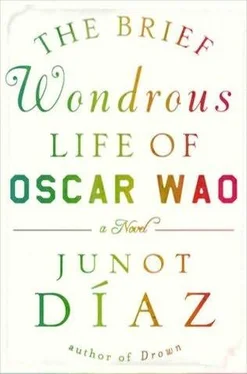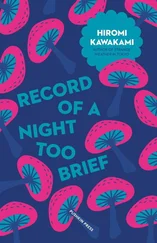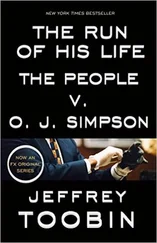Losing your house and all your properties, that was par for the course with the Trujillato—but the arrest (or if you’re more into the fantastic: that book) precipitated an unprecedented downturn in the family fortune. Tripped, at some cosmic level, a lever against the family. Call it a whole lot of bad luck, outstanding karmic debt, or something else. (Fukú?) Whatever it was, the shit started coming at the family something awful and there are some people who would say it’s never ever stopped.
The family claims the first sign was that Abelard’s third and final daughter, given the light early on in her father’s capsulization, was born black. And not just any kind of black. But black black—kongo-black, shango-black, kali-black, zapote-black, rekha-black—and no amount of fancy Dominican racial legerdemain was going to obscure the fact. That’s the kind of culture I belong to: people took their child’s black complexion as an ill omen.
You want a real first sign?
Not two months after giving birth to the third and final daughter (who was named Hypatia Belicia Cabral) Socorro, perhaps blinded by her grief: by her husband’s disappearance, by the fact that all her husband’s family had begun avoiding them like, well, a fukú, by postpartum depression, stepped in front of a speeding ammunition truck and was dragged nearly to the front of La Casa Amarilla before the driver realized something was wrong. If she wasn’t dead on impact she was certainly dead by the time they pried her body from the truck’s axles.
It was the very worst kind of luck, but what could be done? With a dead mom and a dad in prison, with the rest of the family scarce (and I mean Trujillo-scarce), the daughters had to be divvied up among whoever would take them. Jackie got sent to her wealthy godparents in La Capital, while Astrid ended up with relatives in Sanjuan de la Maguana.
They never saw each other or their father again.
Even those among you who don’t believe in fukú’s of any kind might have wondered what in Creation’s name was going on. Shortly after Socorro’s horrible accident, Esteban the Gallo, the family’s number-one servant, was fatally stabbed outside a cabaret; the attackers were never found. Lydia perished soon after, some say of grief: others of a cancer in her womanly parts. Her body was not found for months. After all, she lived alone.
In 1948, Jackie, the family’s Golden Child, was found drowned in her godparents’ pool. The pool that had been drained down to its last two feet of water. Up to that point she’d been unflaggingly cheerful, the sort of talkative negra who could have found a positive side to a mustard-gas attack. Despite her traumas, despite the circumstances around her separation from her parents, she disappointed no one, exceeded all expectations. She was number one in her class academically, beating out even the private-school children of the American Colony, so off-the-hook intelligent she made a habit of correcting her teachers’ mistakes on exams. She was captain of the debate team, captain of the swim team, and in tennis had no equal, was fucking golden. But never got over the Fall or her role in it, was how people explained it. (Though how odd is it that she was accepted to medical school in France three days before she ‘killed herself’ and from all evidence couldn’t wait to be gone from Santo Domingo.)
Her sister, Astrid—we scarcely knew you, babe—wasn’t much luckier. In 1951, while praying in a church in San Juan, where she lived with her tíos, a stray bullet flew down the aisle and struck her in the back of the head, killing her instantly. No one knew where the bullet had come from. No one even recalled hearing a weapon discharge.
Of the original family quartet, Abelard lived the longest. Which is ironic since nearly everyone in his circle, including La Inca, believed the government when they announced in 1953 that he was dead. (Why did they do this? Because.) It was only after he died for real that it was revealed that he’d been in Nigüa prison all along. Served fourteen straight years in Trujillo’s justice. What a nightmare.↓
≡ Nigüa and El Pozo de Nagua were death camps—Ultamos—considered the worst prisons in the New World. Most niggers who ended up in Nigüa during the Trujillato never left alive, and those who did probably wished they hadn’t. The father of one of my friends spent eight years in Nigüa for failing to show proper deference toward the Jefe’s father, and he once spoke of a fellow prisoner who made the mistake of complaining to his jailers about a toothache. The guards shoved a gun in his mouth and blew his brains into orbit. I bet it don’t hurt now, the guards guffawed. (The one who actually committed the murder was known thereafter as El Dentista.) Nigüa had many famous alumni, including the writer Juan Bosch, who would go on to become Exiled Anti-Trujillista Number One and eventually president of the Dominican Republic. As Juan Isidro Jiménes Grullón said in his book Una Gestapo en América , ‘es mejor tener cien niguas en un pie que un pie en Nigüa’.
A thousand tales I could tell you about Abelard’s imprisonment—a thousand tales to wring the salt from your mother-fucking eyes—but I’m going to spare you the anguish, the torture, the loneliness, and the sickness of those fourteen wasted years, spare you in fact the events and leave you with only the consequences (and you should wonder, rightly, if I’ve spared you anything).
In 1960, at the height of the clandestine resistance movement against Trujillo, Abelard underwent a particularly gruesome procedure. He was manacled to a chair, placed out in the scorching sun, and then a wet rope was cinched cruelly about his forehead. It was called La Corona, a simple but horribly effective torture. At first the rope just grips your skull, but as the sun dries and tightens it, the pain becomes unbearable, would drive you mad. Among the prisoners of the Trujillato few tortures were more feared. Since it neither killed you nor left you alive. Abelard survived it but was never the same. Turned him into a vegetable. The proud flame of his intellect extinguished. For the rest of his short life he existed in an imbecilic stupor, but there were prisoners who remembered moments when he seemed almost lucid, when he would stand in the fields and stare at his hands and weep, as if recalling that there was once a time when he had been more than this. The other prisoners, out of respect, continued to call El Doctor. It was said he died a couple of days before Trujillo was assassinated. Buried in an unmarked grave somewhere outside of Nigüa. Oscar visited the site on his last days. Nothing to report. Looked like every other scrabby field in Santo Domingo. He burned candles, left flowers, prayed, and went back to his hotel. The government was supposed to have erected a plaque to the dead of Nigüa Prison, but they never did.
THE THIRD AND FINAL DAUGHTER
What about the third and final daughter, Hypatia Belicia Cabral, who was only two months old when her mother died, who never met her father, who was held by her sisters only a few times before they too disappeared, who spent no time inside Casa Hatüey, who was the literal Child of the Apocalypse?
What about her? She was not as easy to place as Astrid or Jackie; she was a newborn, after all, and, well, the scuttlebutt around the family has it that as she was so dark no one on Abelard’s side of the family would take her. To make matters worse, she was born bakiní—underweight, sickly. She had problems crying, problems nursing, and no one outside the family wanted the dark child to live. I know it’s taboo to make this accusation, but I doubt that anybody inside the family wanted her to live, either. For a couple of weeks it was touch and go, and if it hadn’t been for a kindly dark-skinned woman named Zoila who gave her some of her own baby’s breast milk and held her for hours a day she probably wouldn’t have made it. By the end of her fourth month the baby seemed to be staging a comeback. She was still bakiní central, but she was starting to put on weight, and her crying, which before had sounded like a murmur from the grave, was growing more and more piercing. Zoila (who had become a guardian angel of sorts) stroked the baby’s mottled head and declared: Another six months, mi’jita, and you’ll be mas fuerte que Lílis.
Читать дальше







![О Генри - Недолгий триумф Тильди [The Brief Debut of Tildy]](/books/415353/o-genri-nedolgij-triumf-tildi-the-brief-debut-of-thumb.webp)




